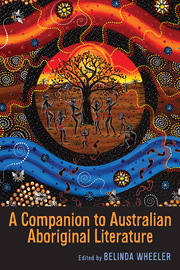Book contents
- Frontmatter
- Contents
- Foreword
- Acknowledgments
- Chronology
- Introduction: The Emerging Canon
- 1 Indigenous Life Writing: Rethinking Poetics and Practice
- 2 Australian Aboriginal Life Writers and Their Editors: Cross-Cultural Collaboration, Authorial Intention, and the Impact of Editorial Choices
- 3 Contemporary Life Writing: Inscribing Double Voice in Intergenerational Collaborative Life-Writing Projects
- 4 European Translations of Australian Aboriginal Texts
- 5 Tracing a Trajectory from Songpoetry to Contemporary Aboriginal Poetry
- 6 Rites/Rights/Writes of Passage: Identity Construction in Australian Aboriginal Young Adult Fiction
- 7 Humor in Contemporary Aboriginal Adult Fiction
- 8 White Shadows: The Gothic Tradition in Australian Aboriginal Literature
- 9 Bold, Black, and Brilliant: Aboriginal Australian Drama
- 10 The “Stolen Generations” in Feature Film: The Approach of Aboriginal Director Rachel Perkins and Others
- 11 A History of Popular Indigenous Music
- Notes on the Contributors
- Index
5 - Tracing a Trajectory from Songpoetry to Contemporary Aboriginal Poetry
Published online by Cambridge University Press: 05 September 2013
- Frontmatter
- Contents
- Foreword
- Acknowledgments
- Chronology
- Introduction: The Emerging Canon
- 1 Indigenous Life Writing: Rethinking Poetics and Practice
- 2 Australian Aboriginal Life Writers and Their Editors: Cross-Cultural Collaboration, Authorial Intention, and the Impact of Editorial Choices
- 3 Contemporary Life Writing: Inscribing Double Voice in Intergenerational Collaborative Life-Writing Projects
- 4 European Translations of Australian Aboriginal Texts
- 5 Tracing a Trajectory from Songpoetry to Contemporary Aboriginal Poetry
- 6 Rites/Rights/Writes of Passage: Identity Construction in Australian Aboriginal Young Adult Fiction
- 7 Humor in Contemporary Aboriginal Adult Fiction
- 8 White Shadows: The Gothic Tradition in Australian Aboriginal Literature
- 9 Bold, Black, and Brilliant: Aboriginal Australian Drama
- 10 The “Stolen Generations” in Feature Film: The Approach of Aboriginal Director Rachel Perkins and Others
- 11 A History of Popular Indigenous Music
- Notes on the Contributors
- Index
Summary
Aboriginal poetry enjoyed a tremendously rapid evolution during the latter half of the twentieth century. In 1964, Oodgeroo Noonuccal published We Are Going, the first book of poetry by an Aboriginal author. Since the 1970s, poetry has been at the forefront of Aboriginal political expression. poets like Noonuccal, Kevin Gilbert, and Lionel Fogarty have used the medium to forge new possibilities for the expression of contemporary Aboriginal thought. At the beginning of the twenty-first century, established poets like Fogarty and emerging talents like Samuel Wagan Watson and Ali Cobby Eckermann are some of the most widely read and exciting poets in Australia. However, while these poets are gaining increased attention, their position within Western critical discourse remains somewhat awkward. Literary critics have seldom rigorously engaged with oral Aboriginal poetry, thereby failing to acknowledge the extensive indigenous cultural heritage of contemporary Aboriginal writers. instead, musicologists and anthropologists have been left to research oral Aboriginal poetics, but within an empirical framework that generally denudes the songpoems of their poetic qualities. Consequently, there is an enormous lacuna in Australian literary studies about the relationship of contemporary Aboriginal poetry to traditional forms of songpoetry. This relates to a larger, more willful ignorance of the relationship between the voice of the poet and the text that is printed on the page. I will argue in this essay that to separate these two modalities is to deny the importance of much of the Aboriginal poetic tradition.
- Type
- Chapter
- Information
- A Companion to Australian Aboriginal Literature , pp. 89 - 106Publisher: Boydell & BrewerPrint publication year: 2013



